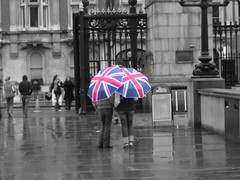 Visas are required for all U.S. citizens traveling to the United Kingdom and are usually applied for upon arrival.
Visas are required for all U.S. citizens traveling to the United Kingdom and are usually applied for upon arrival.
After you disembark from the plane, you will be standing in a line, or queue, awaiting a brief interview from the Immigration Officer who will stamp your passport with a visa set to expire six months from the date of entry into the U.K.
Before you land, you will be asked to fill in a white, non-immigrant visa landing card that you will present to the immigration officer, along with your passport. That officer will ask you questions about the purpose of your visit, length of stay, and whether this is this a return trip to the United States or if you going on to a different country after your visit to the U.K.
The officer will likely ask to see your return airline ticket and evidence of funds for your stay, and any travel insurance papers; as well as where you will be staying and if you’ve already made reservations, and any letters substantiating your visit from employers or schools.
You may be asked more questions, you may be asked less questions. It’s best to have all your papers handy upon arrival. Some people feel their papers are safer locked in their suitcase under their plane, thinking that they will grab their luggage after they arrive and then go through immigration control. This will do you no good during your interview. You must have your papers on you to be granted entry through the checkpoint.
Most interviews take a minute or less and your visitor’s visa is stamped within your passport with a date. If you need a visa before you arrive to the United Kingdom, you will have to obtain an entry clearance visa. Some people simply prefer to get the visa out of the way before getting to the U.K., others need special clearance due to criminal history or if there was a previous expulsion from the country. If your stay will be longer than six months, for work, school or family reasons, then you will be ask to register with the police. There is an associated fee.
Visitor visas may be tagged as follows:
- family visitor
- business visitor
- tourist and shoppers
- social functions, including marriage
- attending cultural events such as art shows or concerts
- extended layovers
Visitors to the United Kingdom should have travel medical insurance although their visa allows for emergency service under the National Health Service. Non-emergency service can still be administered through National Health, but will need to be paid for at the time of service.
